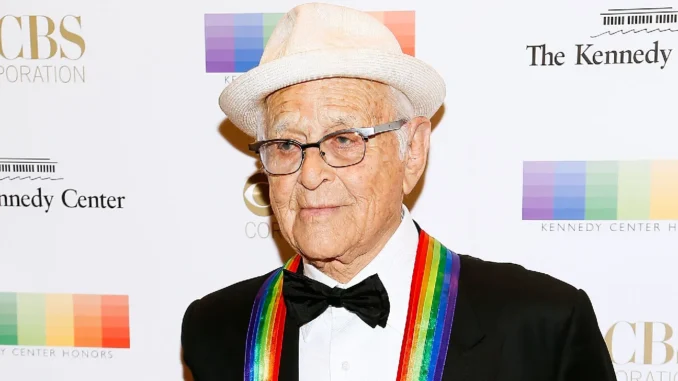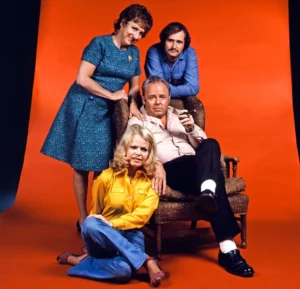
The acclaimed comedic writer and one of the latest recipients of the Kennedy Center Honors reflects on his pioneering sitcom and the birth of political satire on primetime comedy television.
Early this month, the Kennedy Centers Honors welcomed legendary comedy writer-producer Norman Lear into its ranks (the celebration airs Dec. 26 on CBS). True to character, the feisty 95-year-old responded humbly to the honor, but defiantly toward the event, refusing to attend if the president made his customary appearance. President Trump ultimately blinked, as others have throughout Lear’s career, backing away so that all of this year’s recipients could enjoy their moment without any political distraction.
Modest but strong in the face of adversity, stubborn yet sweet with his artistic visions, Lear is one of the few people in the history of television who has provided such a level of creative comedic integrity that challenges the country’s ideals and makes viewers consider the world in different ways. Nowhere is this more evident than with Lear’s defining sitcom, All in the Family.
Nothing that came before the show’s premiere Jan. 12, 1971, prepared America for the Bunker family. In place of the typical hijinks of sitcoms characterized by silly situations and punchlines, Lear skillfully navigated difficult subject terrain, popping up biting dialogue and situational humor without forcing it down. Dangerous, endearing, provocative and funny, Lear’s masterpiece of one-act storylines, revolving around a bigoted patriarch, uniquely melded politics, frailties, prejudices and entanglements under a single roof in Queens, N.Y. In doing so, it bridged the gap between news and humor to forge a unique form of political comedic expression.
Archie’s (Carroll O’Connor) bigotry, his dark side, never won. He always received his comeuppance in a blaze of glorious karma. Yet few remember those surface conclusions nearly as much as the issues raised by Lear, ones that encouraged honest conversations and real emotion among viewers.

Early episodes ran a disclaimer, an apology of sorts, at the front of every episode. CBS enlisted extra operators in anticipation of a wave of angry callers who never materialized. Vocal debates ensued about whether the show called out prejudice or glorified it. After all, a lovable bigot, could there even be such a thing? Anyone who has ever attended a family gathering with a potpourri of relatives would say so indeed.
People are complex. Life can be messy. In Archie’s case, his actions came from a fear of progress to the point of striking out at anything modern. The theme song “Those Were the Days” could be his epitaph. Michael (Rob Reiner), a liberal hippie “meathead” with a strong sense of justice, nevertheless struggled with the women’s movement and his wife initiating sex (in his mind, male territory). Gloria (Sally Struthers), the breadwinner in the marriage (so that Michael could attend graduate school), exuded a complicated riverbed of extreme emotions good and bad. And at the center of it all rested Edith (Jean Stapleton), the faithful “dingbat” housewife who represented the heart and soul of the Bunker residence and the optimism in the human spirit so many people wish they had.
Nobody’s perfect, not even Lear, but with one show he achieved a level of perfection few reach with their art. In celebration of Lear, his work and his Kennedy Center Honors recognition (as well as the upcoming 47th anniversary since All in the Family originally premiered), The Hollywood Reporter sat down with the prolific producer to talk politics, comedy and more.
You made a bold statement regarding Trump attending the Kennedy Center Honors. Most people would assume you’re a firebrand liberal. How would you describe your politics these days?
I think of myself as a bleeding-heart conservative. Conservative because you will not fuck with my Constitution, my Bill of Rights — those guarantees that the country has made to 100 percent of all U.S. citizens. My heart bleeds for people who are being overlooked or are not getting the benefit of those promises.
In the late 1960s, what made you think the time was right for a sitcom dealing with political and social satire?
My partner, Bud Yorkin, was making a film in London. He called and told me about this British show called Till Death Us Do Part. I said, “Holy shit, I’ve lived through that.” My father used to call me the laziest white kid he ever met, and then dumb because I didn’t understand. I’d scream at him that he didn’t have to put down a race of people to call his son lazy. He’d shout, “That’s not what I’m doing!” So, I heard the description of this series and thought, Why can’t that be an American show? My partner then contacted the British agent who handled Johnny Speight, that show’s creator. She called me up and asked if I’d like the rights and I grabbed them.